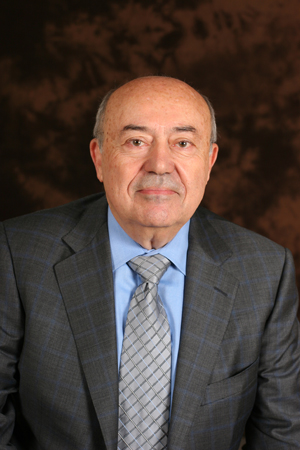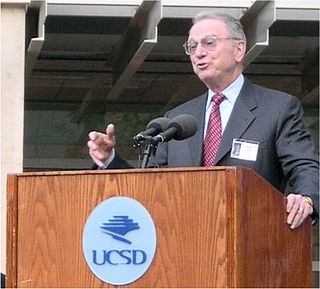Related Research Articles

Andrew James Viterbi is an Italian Jewish–American electrical engineer and businessman who co-founded Qualcomm Inc. and invented the Viterbi algorithm. He is the Presidential Chair Professor of Electrical Engineering at the University of Southern California's Viterbi School of Engineering, which was named in his honor in 2004 in recognition of his $52 million gift.

Irwin Mark Jacobs is an American electrical engineer and businessman. He is a co-founder and former chairman of Qualcomm, and chair of the board of trustees of the Salk Institute. As of 2019, Jacobs has an estimated net worth of $1.2 billion.
Jeanne Ferrante is a computer scientist active in the field of compiler technology, where she has made important contributions regarding optimization and parallelization. Jeanne Ferrante is Professor of Computer Science and Engineering at University of California, San Diego. She received her B.A. from New College at Hofstra University in 1969, and her Ph.D. from Massachusetts Institute of Technology in 1974. Prior to joining UC San Diego in 1994, she taught at Tufts University from 1974 until 1978, where she worked on computational complexity problems such as the theory of rational order and first order theory of real addition. In 1978, she worked as a research staff at the IBM T.J. Watson Research Center until 1994.

Miroslav Krstić is a Serbian-born American control theorist and Distinguished Professor of Mechanical and Aerospace Engineering at the University of California, San Diego (UCSD). Krstić is also the director of the Center for Control Systems and Dynamics at UCSD and a Senior Associate Vice Chancellor for Research.
Henrik Iskov Christensen is a Danish roboticist and Professor of Computer Science at Dept. of Computer Science and Engineering, at the UC San Diego Jacobs School of Engineering. He is also the Director of the Contextual Robotics Institute at UC San Diego.

The California Institute for Telecommunications and Information Technology (Calit2, previously Cal(IT)2), also referred to as the Qualcomm Institute (QI) at its San Diego branch, is a $400 million academic research institution jointly run by the University of California San Diego (UCSD) and the University of California, Irvine (UCI); in January 2022, plans were announced to add University of California, Riverside to the consortium. Calit2 was established in 2000 as one of the four UC Gray Davis Institutes for Science and Innovation. As a multidisciplinary research institution, it is conducting research discovering new ways in which emerging technologies can improve the state's economy and citizens' quality of life. Keeping in mind its goal of addressing large-scale societal issues, Calit2 extends beyond education and research by also focusing on the development and deployment of prototype infrastructure for testing new solutions in real-world environments. Calit2 also provides an academic research environment in which students can work alongside industry professionals to take part in conducting research and prototyping and testing new technologies.
The Irwin and Joan Jacobs School of Engineering is an undergraduate and graduate-level engineering school offering BS, BA, MEng, MS, MAS and PhD degrees at the University of California, San Diego in San Diego, California. The Jacobs School of Engineering is the youngest engineering school of the nation's top ten, the largest by enrollment in the University of California system, as well as the largest engineering school on the West Coast and the ninth-largest in the country. More than thirty faculty have been named members of the National Academies. The current dean of the Jacobs School of Engineering is Albert P. Pisano. The Jacobs School of Engineering sends a monthly news email which anyone can subscribe to.

Paul E. Jacobs is an American businessman and the former executive chairman of Qualcomm.
Yuanyuan (YY) Zhou is a Chinese and American computer scientist and entrepreneur. She is a professor of computer science and engineering at the University of California, San Diego, where she holds the Qualcomm Endowed Chair in Mobile Computing. Her research concerns software reliability, including the use of data mining to automatically detect software bugs and flexible system designs that can adapt to hardware platform variations. She is also the founder of three start-up companies, Emphora, Pattern Insight, and Whova.
Alexander Vardy was a Russian-born and Israeli-educated electrical engineer known for his expertise in coding theory. He held the Jack Keil Wolf Endowed Chair in Electrical Engineering at the University of California, San Diego. The Parvaresh–Vardy codes are named after him.
Rajesh K. Gupta is a computer scientist and engineer, currently the Qualcomm Professor in Embedded Microsystems at University of California, San Diego. His research concerns design and optimization of cyber-physical systems (CPS). He is a Principal Investigator in the NSF MetroInsight project and serves as Associate Director of the Qualcomm Institute. His research contributions include SystemC and SPARK Parallelizing High-level Synthesis. Earlier he led NSF Expeditions on Variability in Microelectronic circuits.
Nagarajan Ranganathan was a Distinguished University Professor of Computer Science and Engineering at the University of South Florida, Tampa, United States. He was elected as a Fellow of IEEE in 2002 for his contributions to algorithms and architectures for VLSI systems. He was elected Fellow of AAAS in 2012. He served as the Editor-in-Chief of IEEE Transactions on VLSI Systems.
Alon Orlitsky is an information theorist and the Qualcomm Professor for Information Theory and its Applications at University of California, San Diego. He received a BSc in Mathematics and Electrical Engineering from Ben Gurion University in 1981, and a PhD in Electrical Engineering from Stanford University in 1986. He was a member of Bell Labs from 1986 to 1996, and worked for D. E. Shaw from 1996 to 1997. He joined UCSD in 1997.

Pamela Cosman is a professor of Electrical and Computer Engineering at the University of California, San Diego. She has conducted a pioneering research on the quality of compressed images for application in medical diagnostic imaging. At UCSD, Cosman currently researches ways to improve wireless video transmission.

The National Institute of Technology Tiruchirappalli is a national research deemed university near the city of Tiruchirappalli in Tamil Nadu, India. It was founded as Regional Engineering College Tiruchirappalli in 1964 by the governments of India and Tamil Nadu under the affiliation of the University of Madras. The college was granted deemed university status in 2003 with the approval of the University Grants Commission (UGC), the All India Council for Technical Education (AICTE), and the Government of India and renamed the National Institute of Technology Tiruchirappalli.
Nambirajan Seshadri is a professor of practice at the Department of Electrical and Computer Engineering, Jacobs School of Engineering, University of California, San Diego.
Albert Yu-Min Lin is an American engineer, scientist, technologist, explorer and television host. He is a Senior Lecturer, Mechanical and Aerospace Engineering at University of California, San Diego. Since 2019 he has been the presenter of Lost Cities With Albert Lin.
Anthony Acampora is a professor emeritus of Electrical and Computer Engineering as well as the founder of the Center for Wireless Communications at the University of California, San Diego.

Duygu Kuzum is a Turkish-American electrical engineer who is a professor at the University of California, San Diego's Jacobs School of Engineering. She develops transparent neural sensors based on single-layer materials. She was awarded a National Institutes of Health New Innovator Award in 2020.
References
- ↑ http://rrao.ucsd.edu/RRaoCV.pdf [ bare URL PDF ]
- ↑ "UCSD Jacobs School of Engineering". jacobsschool.ucsd.edu. Retrieved 24 March 2017.
- ↑ QI. "Qualcomm Institute - UC San Diego". qi.ucsd.edu. Retrieved 24 March 2017.
- ↑ Curran, Maureen C. "Ramesh R. Rao". rrao.ucsd.edu. Retrieved 24 March 2017.
- ↑ "NIT Trichy - Distinguished Alumni". www.nitt.edu. Retrieved 24 March 2017.